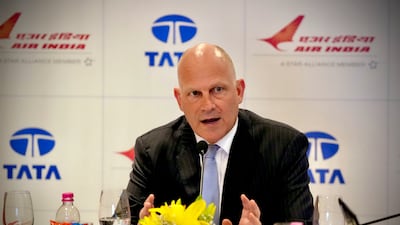Air India on Tuesday revealed plans to become one of the world's leading airlines, more than a year after it was taken over by Tata Group.
“We are very much embarked upon a transformation journey to put Air India quite firmly back in the top tier of international aviation,” said Campbell Wilson, the airline's managing director and chief executive.
“It is really an ambition to be back to world-class.”
However, he said it would be a challenging process after "years of neglect and underinvestment" in the airline.
“We are working at full steam to repair and restore but it will take some time,” said Mr Wilson, who added that he was “very confident” there was a path to profitability albeit with further hard work and investment.
Air India was privatised last year and has a fleet of about 100 aircraft, most of which are leased. This month, the airline placed an order for 470 Boeing and Airbus planes, marking the largest deal in commercial aviation history in a move aimed at transforming the airline under its new owners.
The New Delhi-based flag carrier will buy 220 planes from Boeing and 250 from Airbus. It said it was planning to fund the $70 billion order with internal cash, equity and sale and leasebacks.
Tata Group formally took over Air India in January last year after the government's long-awaited privatisation of the debt-laden and loss-making airline in a 180 billion rupee deal ($2.17 billion) for 100 per cent ownership.
Once a prestigious company, Air India had deteriorated over the years. The government had long been trying to privatise the airline amid criticism that it was bleeding taxpayers' money.
Since its takeover, Tata Group has been striving to turn fortunes around.
The latest aircraft order is part of an effort by Air India to expand internationally and bolster its position to compete with some of the top airlines in the world.
“India's geography is such that we can serve virtually all of the world,” said Mr Wilson, who added that the potential for Indian aviation was significant.
He said the airline was strongly focused on long-haul routes.
Air India recently said it planned to hire more than 4,200 cabin crew and 900 pilots as part of its expansion.
Mr Wilson said the biggest challenge was recruitment, and that the airline was investing in an academy to address this problem.
Tata Group also announced plans to merge Air India with Vistara, an airline owned by Tata in a joint venture with Singapore Airlines.
The proposed merger, which is awaiting regulatory clearance, is expected to be completed by next year.
Under the plans, Tata would hold nearly 75 per cent of the entity, while Singapore Airlines — which is expected to invest $252 million — would own the remaining stake.
Air India has also started a $400 million refurbishment programme for its aircraft, which includes replacing seats and entertainment systems.
The Indian market has enormous potential when it comes to air travel, analysts say, as only a single-digit percentage of the country's population travels by air, however, passenger numbers are expected to grow as middle-class incomes rise.

